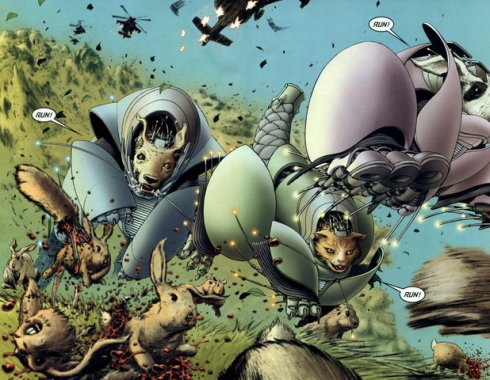In response to Matthew’s post on WE3 and Freud, I find the argument a compelling interpretation. I’m going to propose a different interpretation: perhaps, they are returning to their pet “selves”. Could it be home is not a place but a state of being? Or rather returning to the state of being a pet, animal? Finding their lost selves? Remember, each one of these guys was a lost pet.
Bandit (so typical and uninspiring)
He says “gud” and “bad” a lot. Think about how we (humans) raise dogs. GOOD DOG! BAD DOG! Small wonder that Bandit lives in a black and white world of “gud” and”bad”. His ability to talk only verbalizes, adds to his behavior – he just wants to please.
Tinker (lamest name ever for a badass cat)
He just seems like a really angry cat -laid back ears and very destructive behavior. Is his aggression from his technology or natural inclinations and instincts (this seems indistinguishable to me)? Think about how cats are. They do as they please. Tinker wants to be pleased.
Pirate (my favorite character)
On a personal note, Pirate reminds me of Efrim (the rabbit my son had). Rabbits are actually quite smart and social (look at the page where Pirate is amongst real – natural – rabbits). They have some interesting qualities: they can be very eager to please but usually confined to one human person (though they are very social among themselves); they can be pretty mean and very destructive; and, they are long suffering without a sound, a way to complain (other than a high shriek). Rabbits just like to do their thing (i.e., non-stop eating), that’s what pleases them the most. For some reason, Pirate reminds me of Harry Angstrom in Updike’s Rabbit, Run – he really never stood a chance, no matter how fast he ran, or how hard he tried.
Reverting back to pets (or regained humanity)
So, as an additional layer of interpretation, is this a commentary about technology and human-ness? Can or will technology overtake our human-ness? Will we, humans, have the ability to shed our dependence on technology? No matter how much technology we pile on a human, does the essence of human-ness remain and eventually resurface?
I see this story not of finding the place called home, but finding home the return to their animal, pet, nature, state. Yes, the Freudian analysis is very interesting and compelling. It’s not all encompassing, but another lens with which to examine and explore the dynamics of the WE3 animals.
Who is Pirate telling to run? Bandit and Tinker? The rabbits in the field? Or is he talking about himself in third person?

Maybe they should have run …. (who’s telling who to run?). Why are the rabbits standing at attention even though someone is yelling “run!”? How do they or do they see Pirate (and the others?) Why are they not afraid and run right away (as they normally would)? Do they hear Pirate first and assume he is “one of them”, then only run when they see him? How does this affect the interpretation of these scenes, of Pirate, Bandit and Tinker? I think the ambiguity here is intentional and, at the same time, makes a strong statement about nature (human) versus technology and how it is viewed.

![]()
